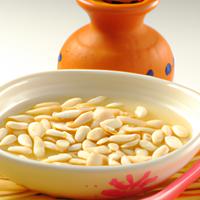
1 serving (30 grams) contains 135 calories, 7.5 grams of protein, 12.0 grams of fat, and 4.5 grams of carbohydrates.

Log this food in SnapCalorie

Nutrition Information
Calories |
675 | ||
|---|---|---|---|
% Daily Value* |
|||
| Total Fat | 60 g | 76% | |
| Saturated Fat | 12 g | 60% | |
| Polyunsaturated Fat | 0 g | ||
| Cholesterol | 0 mg | 0% | |
| Sodium | 45 mg | 1% | |
| Total Carbohydrates | 22.5 g | 8% | |
| Dietary Fiber | 7.5 g | 26% | |
| Sugars | 3 g | ||
| protein | 37.5 g | 75% | |
| Vitamin D | 0 mcg | 0% | |
| Calcium | 75 mg | 5% | |
| Iron | 10.5 mg | 58% | |
| Potassium | 750 mg | 15% | |
* Percent Daily Values are based on a 2,000 calorie diet. Your daily values may be higher or lower depending on your calorie needs.
Food Attributes
Source of Calories
About Muskmelon seeds
Muskmelon seeds, derived from the sweet and aromatic muskmelon fruit, are small, flat, white seeds packed with nutritional benefits. Native to regions of Africa and Asia, muskmelon seeds are commonly used in Indian and Middle Eastern cuisines, often added to salads, smoothies, or desserts for a subtle nutty flavor and crunch. These seeds are rich in essential nutrients, including protein, healthy fats, fiber, and key vitamins such as Vitamin E. They are also loaded with antioxidants, which help combat oxidative stress and support overall health. High magnesium content promotes better heart health and regulates blood sugar, making them beneficial for diabetics. Additionally, the seeds aid digestion and may contribute to improved skin health. However, their caloric density means moderation is key for those watching their weight or caloric intake. Muskmelon seeds are a versatile and nutritious ingredient to incorporate into a balanced diet.



